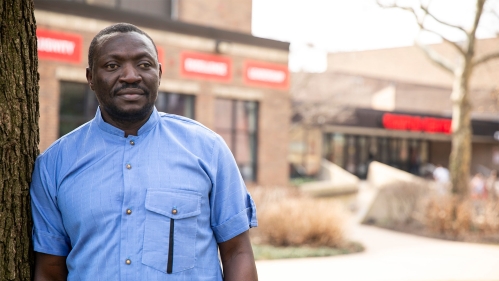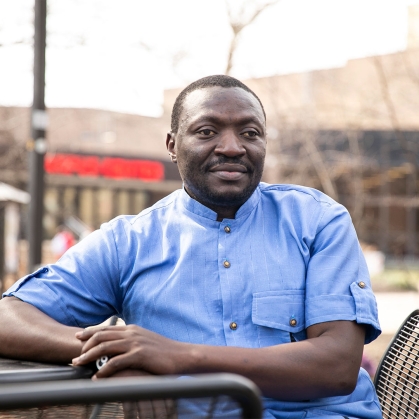Doctoral Student’s Research Will Support Student Wellness

Joseph Abbas, a Ph.D. student in the Rutgers–Camden Prevention Science Program, which focuses on international development, educational reform, health care, and more, has a history of recognizing where and when help will make a difference.

Coming from a background as an orphan in Nigeria, Abbas, who is a first-generation student, attained a master of science in clinical psychology from the University of Jos. After working in customer service at the First Bank of Nigeria, he then began a career as a trauma specialist for various NGOs around Africa. For Abbas, an ability to do work that brings help and hope to others is what makes his research at Rutgers–Camden so special.
“While working for the bank, I saw many people who had been through crises, challenges, and disasters,” Abbas said. “This inspired me to pursue positions in various war zones, where I used my psychology training to mediate the impact these conflicts were having on civilians and soldiers.”
Abbas is working on campus at the Student Wellness Center under the direction of Clinical and Health Educator Stacy Haynes. He is supervised by Program Director Daniel Hart and Associate Professor of Psychology Kristin August. Abbas is researching the impact of social media health apps on student wellness. The project is titled “Exploring the Ripple Effect: The Power of Social Media Health Apps on Rutgers–Camden Students’ Wellness Journey.”
His academic research background has already yielded five scholarly articles and, going forward, Abbas is aiming to bridge gaps in public health, preventive healthcare, health disparities, health promotion, and community-based interventions by exploring how digital platforms influence students’ health choices.
Abbas is now researching how established websites like Health E-Living.com are influencing students’ health choices. The Student Wellness Center is using this site to engage students in monitoring their overall health and well-being. Students can take assessments on topics including eating habits, depression, anxiety, alcohol use, and more. Abbas is collecting data on students' engagement and then exploring digital paths for how the Student Wellness Center can best reach students.
Abbas has been awarded an $8,000 grant from the Chancellor of Rutgers-Camden, Antonio D. Tillis, to further his work.
“This prestigious recognition for Joseph underscores the potential of his work to significantly advance understanding and practices in preventive health care, particularly among young adults,” Haynes said.
Abbas said he was inspired to attend Rutgers–Camden after reading about the Chancellor’s 15 in 5 initiatives. “I felt the Chancellor was a peacemaker,” Abbas said. “And the Prevention Science Program at Rutgers–Camden has been the best choice for me. I am truly seeing how far I can go, and I feel deeply supported by my mentors, Dr. Hart and Dr. August.”
There is a level of prestige that comes with being awarded a grant from the chancellor of Rutgers–Camden. Yet, graduate student Joseph Abbas said the award from Chancellor Tillis is not about Abbas's personal success; the recognition is more about his lifelong commitment to helping others.
“Joseph Abbas is among the best of us,” said Chancellor Tillis. “He came to Rutgers–Camden to learn and to grow. I am so pleased to help him continue his humanitarian commitments in ways, large and small, that may benefit each of us.”
Learn how to apply for a Chancellor’s grant.